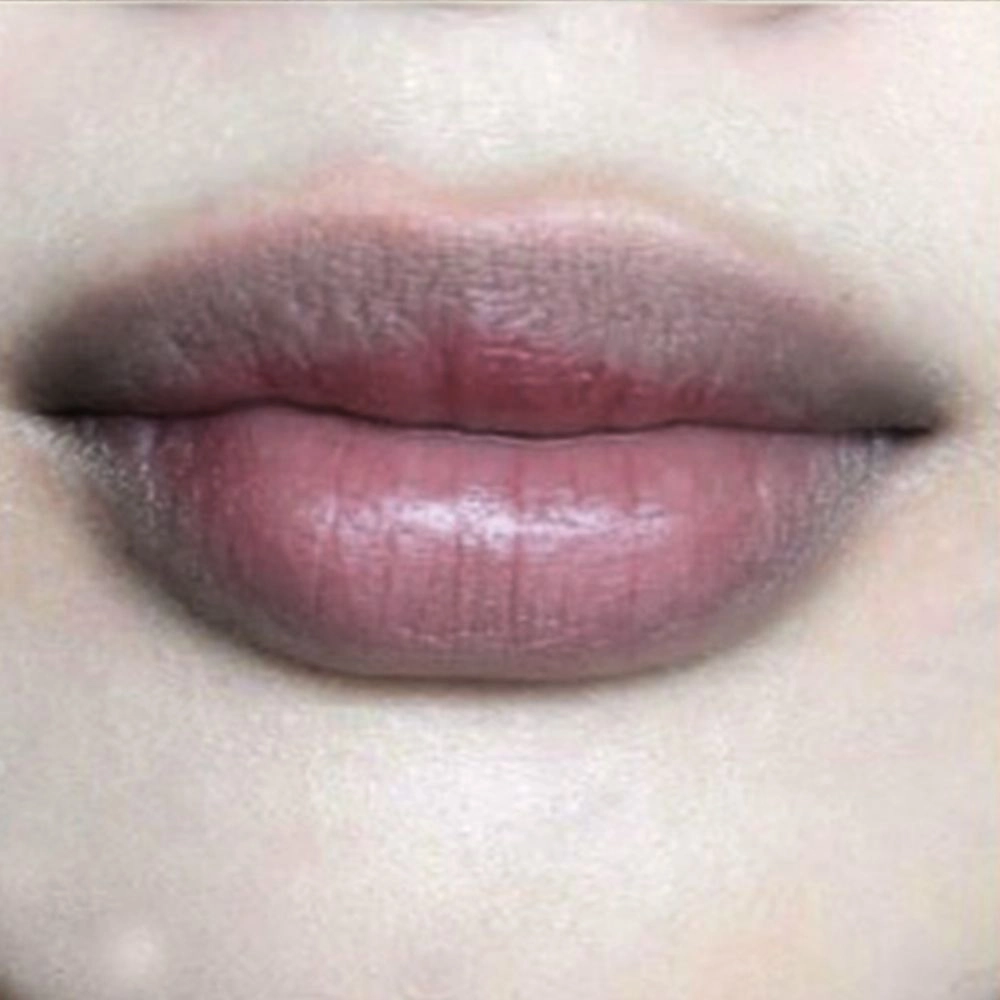Table of content
- Types of BREAST RECONSTRUCTION
- Procedure
- Risks and complications
- Pre-operation preparation
- Post-operative care
- Expected Results and recovery timeline
- Appointments and consultation
- Frequently asked questions
- Meet the team
- Pricing and payment plans
- Medical literature and research
- Support and counseling
- Send a message
DARK LIPS
INDICATION – BRIEF
Dark lips can be caused by various clinical factors, such as poor circulation or oxygenation (cyanosis), allergies, hyperpigmentation due to hormonal changes or certain medications, Smoker’s Melanosis, Vitamin B12 deficiency, or conditions like Peutz-Jeghers syndrome. Non-clinical factors include excessive sun exposure, smoking and heavy alcohol consumption, dehydration, excessive caffeine intake, poor lip care, and use of certain lipsticks or lip products. While some causes are harmless and cosmetic, others can indicate serious underlying health conditions. Thus, if there’s an unexplained darkening of the lips, it is advisable to consult with a healthcare provider for proper diagnosis and treatment.

INDICATION – DEFINITION
Dark lips can be a symptom of a variety of different conditions or lifestyle factors. Here are some common causes:
Clinical Causes
- Cyanosis: This is a condition caused by poor circulation or inadequate oxygenation of the blood. It can lead to bluish discoloration of the skin and mucous membranes, including the lips.
- Allergic Reactions: Certain allergies can lead to darkening of the lips. This could be a reaction to a cosmetic product, food, medication, or even dental materials.
- Hyperpigmentation: This is a condition where parts of your skin become darker than the surrounding areas. It can occur due to various reasons including hormonal changes, as seen in conditions like Addison’s disease or melasma.
- Certain Medications: Some medications, such as antimalarials, chemotherapy drugs, or tricyclic antidepressants, can lead to hyperpigmentation and cause dark lips.
- Smoker’s Melanosis: This condition, more common in smokers, results in increased melanin production leading to darkening of the gums, inner cheeks, and lips.
- Vitamin B12 Deficiency: Lack of this essential vitamin can lead to hyperpigmentation of the mucous membranes, including the lips.
- Peutz-Jeghers Syndrome: A rare genetic condition, Peutz-Jeghers syndrome can cause dark freckles on the lips and the skin around the mouth.
Non-clinical Causes
- Excessive Sun Exposure: Just like the skin, your lips can also tan with prolonged exposure to the sun. This can lead to temporary or permanent darkening of the lips.
- Smoking and Alcohol Consumption: Both smoking and regular, heavy alcohol consumption can cause your lips to darken over time.
- Dehydration: When the body is dehydrated, it can cause the lips to become dry and sometimes darken.
- Excessive Caffeine: Too much consumption of caffeine can cause dark lips.
- Poor Lip Care: Not taking proper care of your lips, such as not moisturizing them or exfoliating dead skin cells, can lead to darkening.
- Lipsticks and Other Lip Products: Certain lipsticks or lip products, especially lower-quality ones, can cause pigmentation over time.
SYMPTOMS AND DIAGNOSIS
Symptoms
- Dryness or cracking
- Discoloration of the inner mouth or gums, in cases of systemic causes
- Bluish hue in cases of cyanosis
- Freckling around the mouth with Peutz-Jeghers Syndrome
- Discoloration of other skin areas with hyperpigmentation disorders
Diagnosis
In terms of diagnosis, the process is largely centered around understanding the underlying cause. As a dermatologist, I would:
- Conduct a thorough physical examination, focusing not just on the lips but also other body parts to identify any related symptoms.
- Review your medical history, including any medications you’re taking and allergies you have.
- Ask about lifestyle habits such as smoking, alcohol consumption, and sun exposure.
- Order blood tests if a vitamin deficiency or systemic illness is suspected.
- Conduct a patch test to identify potential allergens, if an allergic reaction is suspected.
- In rare cases, a biopsy may be necessary, particularly if there’s a suspicion of oral melanoma or other serious conditions.
The diagnostic process is about identifying the root cause of the symptom, in this case, dark lips. The treatment and management then target this underlying cause. If you have noticed darkening of your lips, it’s important to consult with a dermatologist or a healthcare provider to ensure appropriate and timely care.
Prognosis and Impact

In cases where dark lips are caused by lifestyle factors such as smoking, excessive sun exposure, or use of certain cosmetics, the prognosis is typically very good. Once these contributing factors are identified and eliminated, and with proper lip care, the lips can return to their natural color over time.
For dark lips caused by vitamin deficiencies, once the deficiency is corrected, you should see an improvement.
When dark lips are a result of certain medications or treatments like chemotherapy, they may return to their natural color once the treatment is stopped or completed, but this can take some time.
In cases where dark lips are a sign of a more serious underlying condition, such as cyanosis or Peutz-Jeghers Syndrome, the focus would be on treating the primary condition and managing its symptoms. The discoloration of the lips in such cases might persist.
As for the impact, dark lips can cause psychological stress or self-consciousness due to the change in appearance, particularly if the cause is unknown. This can impact self-esteem and social interactions. It’s important to remember that seeking a professional’s help for unexplained changes in your body is crucial to rule out serious conditions and for timely treatment.
Treatment Options
Below are some potential treatment options:
- Lifestyle Changes: If dark lips are caused by smoking, excessive caffeine or alcohol intake, stopping these activities can lead to improvement. Limiting sun exposure and using lip balms with sun protection factor (SPF) can also help.
- Proper Lip Care: Keeping lips moisturized and regularly exfoliating them can help remove dead skin cells and lighten the lips.
- Allergy Management: If dark lips are due to an allergic reaction, identifying and avoiding the allergen is crucial. Over-the-counter or prescription antihistamines may be recommended.
- Medication Adjustment: If a particular medication is causing the discoloration, your doctor may switch you to a different drug if possible.
- Nutritional Supplements: If the dark lips are due to a vitamin deficiency, supplements may be recommended.
- Topical Treatments: In cases of hyperpigmentation, topical creams containing ingredients like hydroquinone, azelaic acid, or kojic acid can be used to lighten the skin. These should only be used under the guidance of a healthcare professional, as improper use can lead to skin damage.
- Medical Procedures: In cases of persistent hyperpigmentation, procedures like chemical peels, laser therapy, or microdermabrasion may be considered to lighten the lips.
- Treatment of Underlying Conditions: If dark lips are a symptom of a systemic condition, treating that condition is necessary.
Risks and Side Effects
The risks and side effects associated with treatments for dark lips are primarily tied to the specific treatment method. Here’s an overview:
- Lifestyle Changes: The side effects of lifestyle changes, such as quitting smoking or reducing caffeine and alcohol intake, are generally positive. However, withdrawal symptoms may occur. Reduced sun exposure has no side effects, but remember that some sun is beneficial for vitamin D synthesis.
- Proper Lip Care: No significant side effects. Over-exfoliation could potentially cause lip irritation and dryness.
- Allergy Management: Antihistamines may cause drowsiness, dry mouth, and dizziness. Always follow the dosage instructions.
- Medication Adjustment: Depending on the replacement medication, side effects will vary. Always consult a healthcare provider for possible side effects.
- Nutritional Supplements: Overdosing on certain vitamins can have negative effects, like diarrhea, nausea, or even nerve damage. Always follow dosage recommendations.
- Topical Treatments: Hydroquinone, azelaic acid, and kojic acid can cause skin irritation, redness, or allergic reactions. Hydroquinone in very rare cases can cause ochronosis, a form of hyperpigmentation. These treatments should be used under professional supervision.
- Medical Procedures: Risks associated with chemical peels, laser therapy, or microdermabrasion can include infection, scarring, or unintended color changes in the skin. A trained professional should conduct these procedures.
- Treatment of Underlying Conditions: The risks and side effects will depend entirely on the treatment for the specific systemic condition.
FAQ Section
Dark lips can be caused by a variety of factors including excessive sun exposure, smoking, dehydration, caffeine consumption, allergic reactions, certain medications, vitamin B12 deficiency, or systemic conditions like cyanosis or Peutz-Jeghers Syndrome.
Dark lips can sometimes be a sign of a more serious medical condition, such as cyanosis, which is a symptom of poor oxygenation. However, they can also be caused by benign factors like excessive sun exposure, smoking, or the use of certain lip products. It’s important to consult with a healthcare provider if you’re unsure.
Yes, there are treatments that can lighten dark lips, ranging from lifestyle changes to topical creams, medical procedures, and treating any underlying conditions. The right treatment will depend on the cause of the darkening.
Yes, smoking can cause your lips to darken. This is due to the nicotine and tar in the tobacco, which can lead to a condition called smoker’s melanosis.
Some preventive measures include proper lip care, avoiding excessive sun exposure, limiting consumption of caffeine and alcohol, quitting smoking, and staying hydrated. If darkening is due to a specific medical condition, addressing that condition is important.
The reversibility of dark lips depends on the cause. If it’s due to lifestyle factors, then yes, changing those factors can reverse the darkening. In other cases, treatment might be needed and the response to treatment can vary from person to person.
Regularly moisturize your lips, protect them from excessive sun exposure, drink plenty of water to stay hydrated, avoid smoking and limit caffeine and alcohol intake, and maintain a healthy diet. If you use lip products, make sure they are of good quality and don’t cause you any allergies.
If the darkening of your lips is sudden, accompanied by other symptoms, or causing you distress, it would be advisable to consult with a healthcare provider to rule out any serious conditions and to receive appropriate treatment.
